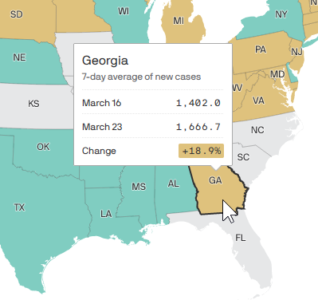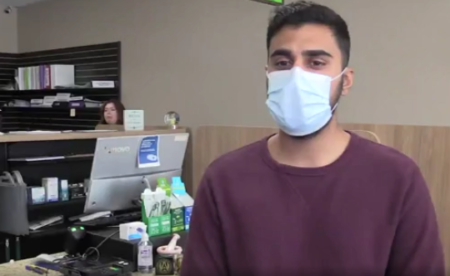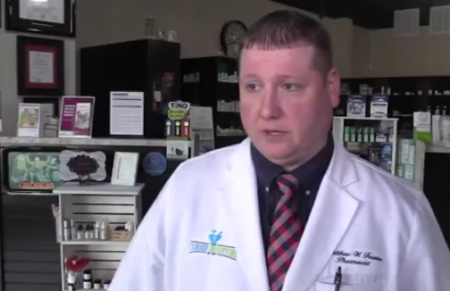Cancer vaccine, why three feet, Indy Health update, and more
26 Mar 2021
Posted by Andrew Kantor
(polite cough)
Covid-19 cases in Georgia and 18 other states are on the rise. Up almost 19 percent week to week in the Peach State.

More on Indy Health
GPhA is putting all the info it’s got on Indy Health on one page — click here.
The latest: Three files from the Arkansas Insurance Commissioner, including…
- What is being sent to beneficiaries from the company
- The robocall script for calls to patients
- The notice to pharmacists for those in the Indy Health network
If you have patients on the Indy Health plan, please go to GPhA’s Indy Health page where you can review those files!
ICYMI: “We’ll double the offer”
President Biden is moving the vaccine goalposts — back. Instead of his initial goal of 100 million shots in 100 days, he’s doubled it, aiming for the country to hit 200 million in the same time.
(We say “shots” because, obviously, some of the vaccines require two.)
So, about ‘six feet’ of social distancing…
Why did it change to three feet all of a sudden? The real question is why was it six feet in the first place. The answer is a bit of a surprise.
The basis for the “science” of 6 feet of distance is rooted in work done with tuberculosis in the late 19th century, not on current scientific inquiry.
So when researchers actually looked at how the virus spreads (among students), they found that “Student case rates were similar in the 242 districts with ≥3 feet versus ≥6 feet of physical distancing between students.”
Yep, when you actually do science, perspective changes.
Bad news for transplantees
Only 17 percent of people who were immunocompromised (because of an organ transplant) showed antibodies after getting either the Moderna or Pfizer Covid-19 vaccines — that’s according to Johns Hopkins researchers.
“Given these observations, we feel that the [CDC] should update their new guidelines for vaccinated individuals to warn immunocompromised people that they still may be susceptible to COVID-19 after vaccination.”
Less is more, tamoxifen edition
Tamoxifen: Good for treating breast cancer, but with notoriously bad side effects. And thus notoriously low adherence.
Swedish researchers, though, think the answer may be as simple as taking less. A lot less.
They report that a substantially lower dose of tamoxifen (2.5 mg) may be as effective as the standard dose (20 mg), but reduced by half the incidence of severe vasomotor symptoms, including hot flashes, cold sweats, and night sweats.
They stress, though, that this is preliminary research. They used the standard efficacy test — breast density — but “We do not know how that translates to actual clinical effect.”
High fives to those on the front lines
Shout out to GPhA members Mike Frazier (in Macon) and Ankit Patel (in Warner Robins) — they were featured in an WMGT-NBC41 report on how small pharmacies are adjusting to Covid vaccine availability.


Covid treatment news
Pfizer is working on a new treatment for Covid-19. Called “PF-07321332,” it’s a protease inhibitor. In preclinical trials, it blocked the SARS-CoV-2 virus — and other coronaviruses from replicating. Clinical trials will start soon.
The latest on remdesivir: It speeds improvement, but it doesn’t reduce deaths.
The final nail in HCQ’s coffin: The FDA looks like it will reject adding hydroxychloroquine to the compounding 503B bulks list.
FDA: Sky falling as people abuse propylhexedrine
The agency issued a warning because “Reports of individuals abusing and misusing propylhexedrine have increased in recent years.”
So how bad is it? A whopping 460 cases … over 20 years. In 2019, there were a total of 74 reported cases of abuse in the entire country.
Hair of the dog, tumor style
University of Chicago molecular engineers have devised what’s essentially a vaccine against cancers — in mice. The trick: Treat the tumor like a disease, and inject patients with their own dead cancer cells to train the immune system to destroy the cancer.
[T]hey found that the dying tumor cells could attract and activate the immune cells, which then could recognize and kill the actual tumor cells growing on the opposite side of the mouse. Since each tumor has its own unique signature of hundreds of molecules that the immune system can recognize, the vaccine promoted a broad, robust immune response.
The Long Read: Covid Treatment edition
Bloomberg has the story of molnupiravir — an antiviral that’s based on well-known chemistry, and could, if you buy the hype, “Transform the Fight Against Covid.”
There are 246 antivirals in development […]. Merck’s molnupiravir is among the furthest along. Its developers hope the pills can be prescribed widely to anyone who gets sick. Think Tamiflu for Covid. The hurdle, beyond ensuring the drug works, is making sure it’s safe.


